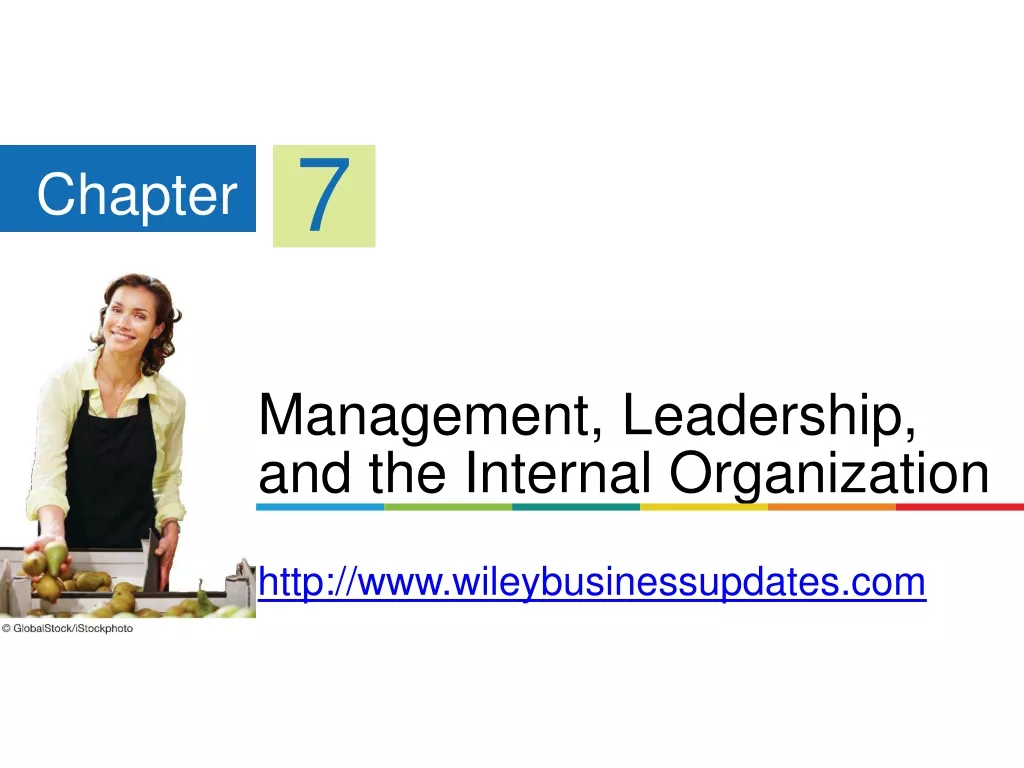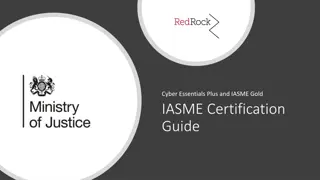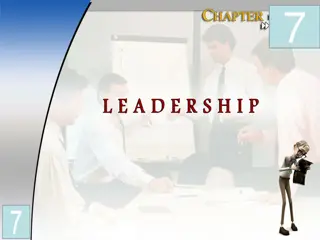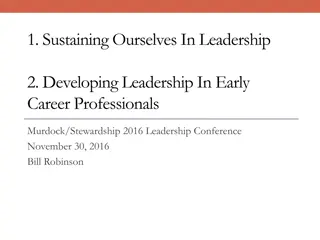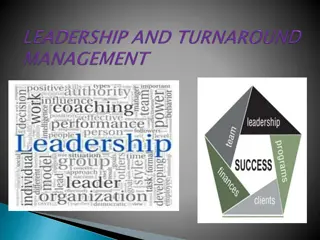Personal Management and Business Leadership Essentials
Striking a balance between personal management and business leadership is crucial for overall success. Module 1 discusses the importance of managing oneself effectively to achieve business goals. It covers topics such as leadership, personal habits for effective management, and the significance of personal planning. Module 2 delves into the essentials of business management, emphasizing the process of directing resources towards profit, and the various responsibilities managers hold at different organizational levels.
Download Presentation

Please find below an Image/Link to download the presentation.
The content on the website is provided AS IS for your information and personal use only. It may not be sold, licensed, or shared on other websites without obtaining consent from the author.If you encounter any issues during the download, it is possible that the publisher has removed the file from their server.
You are allowed to download the files provided on this website for personal or commercial use, subject to the condition that they are used lawfully. All files are the property of their respective owners.
The content on the website is provided AS IS for your information and personal use only. It may not be sold, licensed, or shared on other websites without obtaining consent from the author.
E N D
Presentation Transcript
Entrepreneurship & Business Management N5
Module 1 Personal management INTRODUCTION Striking a balance is of vital importance, because success within a business will only become a reality if you are successful within yourself. Your business is only a part of your life. There are other as important roles that you need to fulfil as well. www.futuremanagers.com
Module 1 Personal management (continued) MANAGEMENT AND LEADERSHIP Leadership is the ability of an individual to obtain the support and action of people to achieve a common goal. Management is about doing the things right while leadership is about doing the right things . www.futuremanagers.com
Module 1 Personal management (continued) PERSONAL MANAGEMENT There are four key areas to bear in mind when making habits for effective personal management: Physical - Develops a healthy body and mind; Mental - Stimulates yourself mentally; Spiritual - Gives you direction and a purpose in life; and Social and emotional - Socialises; builds relationships. www.futuremanagers.com
Module 1 Personal management (continued) PERSONAL PLANNING It s important to be able prioritize and put the first things first when it comes to managing time and schedule. Looking at the goals that one wants to achieve, it is important to understand how much time is needed to dedicate to each goal. This will aid in building the most efficient and successful habits to do one s best. www.futuremanagers.com
Module 2 Management INTRODUCTION Management should be seen as a process of directing the resources and efforts of a business towards opportunities to achieve profit. This takes place by planning and organising, and by applying leadership and control. www.futuremanagers.com
Module 2 Management (continued) RESPONSIBILITIES OF MANAGERS The magnitude of a manager s responsibilities is closely related to his/her position in a business. There are different levels to consider such as: Top level - managers at this level accept responsibility for the business as a whole; Middle - management at this level varies according to the size of a company, but they normally accept responsibility for a specific department of a business; and Lower level management at this level entails supervising the workers to get ajob done. www.futuremanagers.com
Module 2 Management (continued) MANAGEMENT ENVIRONMENTS There are different environments to consider: Internal environment (business); Direct external environment; and Indirect external environment. www.futuremanagers.com
Module 2 Management (continued) MANAGERIAL DECISION-MAKING A strategic planning process includes decisions regarding the future of a business. Steps in the decision-making process www.futuremanagers.com
Module 3 Ethics and social responsibility INTRODUCTION Ethics refer to moral principles or a set of values held by an individual or group. Decisions are then taken in accordance with these principles of conduct. Your personal mission statement is another example of such a set of rules: a set of rules that reflects your own beliefs. www.futuremanagers.com
Module 3 Ethics and social responsibility (continued) BUSINESS ETHICS The business environment is a place where right or wrong issues can be confusing. A suggested method to come to a decision is to apply the ethics check . This includes three questions: Is it legal? Is it balanced? How will it make me feel about myself? www.futuremanagers.com
Module 3 Ethics and social responsibility (continued) ESTABLISHING ETHICAL STANDARDS There is no single standard for ethical behaviour. It is therefore up to the individual businessperson to establish a code of ethics for his/her own business. www.futuremanagers.com
Module 3 Ethics and social responsibility (continued) SOCIAL RESPONSIBILITY Social responsibility refers to an obligation that a person has towards other individuals. A business has the following aspects of social responsibilities: www.futuremanagers.com
Module 4 Organising your business INTRODUCTION The need for organising arises when the business starts to grow and informal arrangements between the small business manager and workers are no longer practical. More work will require a manager to formalise work arrangements. This includes the assigning of tasks to specific individuals. www.futuremanagers.com
Module 4 Organising your business (continued) ORGANISATIONAL STRUCTURE There are several types of organisational structures: The bureaucratic organisational structure; Matrix organisational structure; Flat organisational structure; and Departmentation. www.futuremanagers.com
Module 4 Organising your business (continued) DELEGATION Delegation is the process whereby a manager assigns authority and responsibility to subordinates. The delegation process consists of three different but interrelated phases. www.futuremanagers.com
Module 5 Staffing your business INTRODUCTION Staffing refers to the formal process of ensuring that a business has a qualified workforce to meet its objectives. www.futuremanagers.com
Module 5 Staffing your business (continued) HUMAN RESOURCES PLANNING Human resource planning involves having the right number of people with the proper skills in the right place at the right time to perform the various activities in the business. www.futuremanagers.com
Module 5 Staffing your business (continued) TRAINING AND DEVELOPMENT Training and development of your staff is of vital importance if you want to provide the best possible service to your customers. Training is generally aimed at upgrading the lower level worker in a business. The objective of development is more to maintain and improve the effectiveness of managers. www.futuremanagers.com
Module 5 Staffing your business (continued) MOTIVATING THE WORKFORCE Motivation can be defined as that internal drive or desire that an individual experiences to exert an effort. Research theories on motivation can be divided into three groups: People theories; Job theories; and Organisational theories. www.futuremanagers.com
Module 5 Staffing your business (continued) COMPENSATION Remuneration is the compensation that an employee receives for his labour. These salaries must be enough to motivate them to perform well, but low enough for the business to afford them. www.futuremanagers.com
Module 6 Labour relations INTRODUCTION The relationship between an owner/manager and his or her staff is a vital part in the successful running of any business. The Labour Relations Act spells out the rights of the different parties and provides a framework to regulate relationships between these parties. www.futuremanagers.com
Module 6 Labour relations (continued) COLLECTIVE BARGAINING Collective bargaining is an important way of regulating labour relations and of determining employees wages and benefits. Collective bargaining takes place when trade unions and employers negotiate or try to settle disputes on employment issues. www.futuremanagers.com
Module 6 Labour relations (continued) GRIEVANCE PROCEDURE Every business should have its own grievance procedure, which must be in line with the Labour Relations Act. Employees should be informed about the procedure and must have the freedom to make use of it. www.futuremanagers.com
Module 7 Control INTRODUCTION Control involves checking to determine whether or not your business is progressing towards its goals, and if not, whether it is taking the required corrective action. There are various sources to maintain control: www.futuremanagers.com
Module 7 Control (continued) CONTROL PROCESS www.futuremanagers.com
Module 7 Control (continued) CONTROL METHODS Control methods can be applied to the performance of employees or to the financial performance of the business. Financial control methods can include: Termination of employment; Budgeting; and Ratio analysis. www.futuremanagers.com
Module 7 Control (continued) CONTROL OF TECHNOLOGY Technology implies the use of mechanical, electronic and scientific methods to improve your daily operations. The control process requires up-to-date information. Modern technology can be a great help with this in the form of: Computers; Fax machines and email; Telephones and cellphones; and Photocopiers. www.futuremanagers.com
Module 7 Control (continued) STOCK CONTROL Stock control can also be referred to as inventory control. This forms an important part of the overall control function within a business. Inventories includes: Raw materials; Work-in-progress; and Finished goods. www.futuremanagers.com
Module 7 Control (continued) CREDIT CONTROL A business s needs to finance operations involve the possibility of credit. This could be in the form of: Bank overdraft facility; Suppliers credit; Hire purchase; and Leasing. www.futuremanagers.com
Module 8 Operations management INTRODUCTION Operations management is defined as managing the resources required to produce the products or services provided by a business. It is achieved by making use of various inputs such as raw materials, people, equipment and facilities. www.futuremanagers.com
Module 8 Operations management (continued) DESIGNING OPERATION SYSTEMS The product and service design development process. www.futuremanagers.com
Module 8 Operations management (continued) USING OPERATION SYSTEMS Efficiently managing the operating systems in a business includes: Operations management control; Purchasing management; and Inventory control. www.futuremanagers.com
Module 8 Operations management (continued) MANAGING PRODUCTIVITY Productivity is the relationship between inputs and inputs. The higher the output in comparison with input the more productive the business is. Factors influencing productivity are: Management; Employees Raw materials; Market conditions; and operations. www.futuremanagers.com
Module 8 Operations management (continued) MANAGING QUALITY The basic requirements of a quality control system include the need to: Define what is to be measured; Determine the unit of measurement; Establish the desired level; Perform the measurement and compare it with the desired level; and Accept or reject the lot, or take the necessary steps to change the process. www.futuremanagers.com


